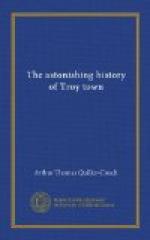My Muse is in a very pretty pass. Gentlest of her sisterhood, she has wandered from the hum of Miss Limpenny’s whist-table into the turmoil of Mars. Even as one who, strolling through a smiling champaign, finds suddenly a lion in his path, and to him straightway the topmost bough of the platanus is dearer than the mother that bare him—in short, I really cannot say how this history would have ended, had not Fortune at this juncture descended to the Club-room in form and speech like to Admiral Buzza.
The Admiral did not convey his son away in a hollow cloud, or even break the Club telescope in Mr. Moggridge’s hand; he made a speech instead, to this effect:
“My sons, attend and cease from strife implacable; neither be as two ravening whelps that, having chanced on a kid in the dells of the mountain, dispute thereover, dragging this way and that with gnashing jaws. For to youth belong anger and biting words, but to soothe is the gift of old age.”
What the Admiral actually said was—“Hullo! what the devil are you young cubs quarrelling about?”
And now, satisfied that no blood is to be spilt, the Muse hies gladly to a very different scene.
In the drawing-room of “The Bower” Mrs. Goodwyn-Sandys was sitting with a puzzled face and a letter on her lap. She had gone to the front door to learn Sam Buzza’s answer, and, having dismissed her messenger, was returning, when the garden-gate creaked, and a blue-jerseyed man, with a gravely humorous face, stood before her. The new comer had regarded her long and earnestly before asking—
“Be you Mrs. Goodwyn-Sandys?”
“I am.”
“Answerin’ to name o’ Geraldine, an’ lawful wife o’ party answerin’ to name o’ Honorubble Frederic?”
“Certainly!” she smiled.
“H’m. Then this ’ere’s for you.” And the blue-jerseyed man handed a letter, and looked at her again, searchingly.
“Is there an answer?”
“No, I reckon.”
She was turning, when the man suddenly laid a finger on her arm.
“Axin’ pardon, but you’ll let ’un down aisy, won’t ’ee? He don’t bear no malice, tho’ he’ve a-suffered a brave bit. Cure ’un, that’s what I say—cure ‘un: this bein’, o’ cou’se, atween you an’ me. An’ look ‘ee here,” he continued, with a slow nod; “s’posin’ the party lets on as he’s a-falled in love wi’ another party, I reckon you won’t be the party to hinder et. Mind, I bain’t sayin’ you cou’d, but you won’t try, will ‘ee? That’s atween you an’ me, o’ cou’se.”
The man winked solemnly, and turned down the path. Before she recovered of her astonishment he had paused again at the gate, and was looking back.
“That’s understood,” he nodded; “atween you an’ me an’ the gate-post, o’ cou’se.”
With that he had disappeared.
Mrs. Goodwyn-Sandys, if bewildered at this, was yet more astonished at the contents of the letter.




